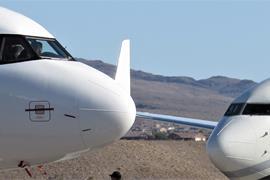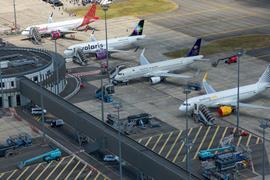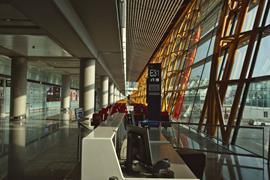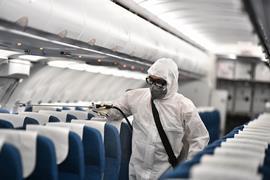On demand webinars
Future of aviation: Improving safety through innovation
How can the industry exploit the very latest disruptive technological trends – such as AI, autonomy, and advanced sensors – to counter these challenges? Hear from our panel of technology leaders on what is available, what is coming down the line, and what technological hurdles still need to be addressed.
Future of aviation - Unlocking the potential of multi-network connectivity
Demand for bandwidth to support the likes of video conferencing and viewing live sports is increasing. By attending this webinar you will learn how in-flight connectivity is changing and will continue to evolve in the next five to 10 years.
The future of seamless weather insights in airline operations
While most airlines understand weather’s impact on flight delays, fewer recognise the untapped potential of weather data APIs to transform operational decision-making across their entire organisation
How AI will impact crew planning and operations
This webinbar explores the point at which AI enhancements evolve into entirely new capabilities and how AI will advance crew management beyond traditional optimization and more effectively manage uncertainties and change in the airline crew landscape
Autonomy in aviation
For decades, autonomy has been one of the industry’s most promising and exciting technologies. Today, it offers benefits from enhanced safety and the easing of cockpit workload to opening new use cases in aviation
Future of aviation: Runway safety
A series of runway incursion and excursion incidents in the past 12 months has highlighted the importance of the industry continuing its laser focus on runway safety. Our expert panel will discuss what the data tells us and the role onboard and on-ground technology, as well as training, can play in eradicating the risk.
Meet the airline sustainability leaders
We bring together chief sustainability officers from three influential carriers to discuss their environmental strategies
Navigating the path to certification for electric aircraft
In this webinar, we look at the developments to date and what to expect from regulatory frameworks in the aviation industry for hybrid and all-electric aircraft. This session will provide valuable insights into the certification landscape, covering aspects from manufacturing to engineering, and its impact on future advancements
How AI is revolutionizing aviation weather
This webinar is exclusively sponsored by The Weather Company. Artificial intelligence has been used in aviation weather forecasting and decision support since the 1980s. Yet, it’s recent breakthroughs in AI methodologies and computational power that are ushering in a transformative era
Can hydrogen power aviation to a zero-carbon future
This webinar is exclusively sponsored by Honeywell. Is hydrogen the answer to aviation’s sustainable aviation challenge? Can it replace carbon-based fuels as a power source for larger aircraft, and what role can it play alongside other disruptive technologies such as electric, hybrid-electric and biofuels?
Can AAM live up to its promise?
Sponsored by exclusive partner: Honeywell. A flurry of advanced air mobility platforms will take to the skies for the first time in 2024 and 2025. In this webinar we look at AAM’s potential for truly disrupting short-distance mobility and the industry’s carbon impact, as well as the many challenges the nascent sector still faces, from regulatory to infrastructure, technical to training, and financial to market acceptance.
Aerospace’s net-zero challenge: the CTO perspective
The technology chiefs of Boeing, Embraer, GKN, Airbus and Honeywell discuss the advances the industry needs to make to deliver its carbon reduction promises over the next two decades. Will progress consist of incremental steps or will a big-bang engineering breakthrough be required to propel the sector into a new sustainable era?
Is SAF up to the sustainability challenge?
In the fourth of the 2023 series of webinars on the industry’s most important agenda items in aviation sustainability, FlightGlobal and a panel of industry experts will take stock of the progress being made as 2023 draws to a close, and what the next steps are. This webinar takes place ...
Business Aviation rising to the sustainability challenge
This webinar will examine the progress being made and challenges being faced by the business aviation community as it pursues environmental strategies to meet the sector’s commitment to achieve net zero greenhouse gas emissions by 2050.
Place your bets on the Disruptive Technologies for Advanced Air Mobility
This webinar will bring insight into the plans of the established aircraft makers and start-up players aiming to launch the first wave of low or zero-emission conventional aircraft, generally up to 9-seats in size.
Disruptive Propulsion Technologies for large commercial aircraft
This webinar will examine how far the drive towards delivering 100-seat plus airliners with propulsion technologies that will deliver fundamentally lower emissions is progressing. It will feature leading technology players to explain developments to date and what to expect in the coming 2-3 years covering electric, hybrid, hydrogen fuel and hydrogen combustion technologies.
Spotlight on airline sustainability strategies
In the fourth of its series of webinars on the industry’s most important agenda items in aviation sustainability, FlightGlobal and a panel of industry experts will take stock of the progress airlines have made, and what the next steps are.
Is there a sustainable future for business aviation?
Business aviation proved resilient to the Covid-19 crisis. However, in the eyes of many activists, the sector – with its low passenger to fuel-use ratio – is a major carbon culprit. In recent years, business aviation has been at the forefront of efforts to drive down the environmental impact of flying. In this webinar, leaders from across business aviation explain what they are doing to improve the industry’s image and what further steps will be necessary to genuinely reduce its emission footprint.
Hydrogen and electrics: the great disruptive propulsion debate
The past two years have seen huge advances in electric propulsion. However, battery weight is a major barrier to scaling up the technology to become commercially viable for anything larger than small general aviation aircraft. Is hydrogen then the breakthrough power source that will allow the industry to transition towards zero-net-carbon? Perhaps, but, again, developments are still in their infancy. Our expert panel will discuss whether hydrogen, electric, or hybrid-electric propulsion represents the best bet for a sustainable future for aviation.
Sustainability: Taking stock of SAF
In the first of its series of four webinars on the industry’s most important agenda items in aviation sustainability, FlightGlobal and a panel of industry experts will take stock of the progress towards the widescale use of sustainable aviation fuels.
Asia-Pacific: a hub for tomorrow’s technologies
The region is rapidly becoming a hub for some of the latest innovations in aviation, from urban air mobility to sustainable propulsion. Ahead of February’s Singapore Airshow, where many of these exciting developments will be major talking points, we bring together a panel disruptive thinkers and aerospace leaders to discuss ...
Future of MRO in Asia-Pacific
Despite the challenges of border closures and flight groundings, the Asia-Pacific region remains one of the most important and dynamic markets for MRO. In this webinar, in partnership with the organisers of the Singapore Airshow, our expert panel will discuss growth prospects and challenges for the sector as airlines resume flights in earnest and recovery begins. What opportunities, for instance, do the rapid growth in international e-commerce, the arrival of latest-generation aircraft, and the emergence of new technologies promise for MRO providers and the wider industry?
Sustainability: How can aviation adapt to changing consumer behaviours?
Aviation and transport were right at the top of the agenda at the recent United Nations COP26 climate change conference in Glasgow and it provided a boost for aviation decarbonisation and the sector’s net zero emissions. The drive towards increased availability and use of sustainable aviation fuels was crystal clear at COP26, as was a critical need for government, industry, and wider stakeholder collaboration to incentivise its use.
Greener airports and smarter air traffic management
What part will advances in air traffic management have on the industry’s push to reduce its carbon footprint over the next decades? From optimal flight paths to reducing congestion around airports, managing the skies more efficiently could be key to sustainability. And airports themselves also have a role to play in making aviation greener. In this live panel discussion, our experts will debate what needs to be done to manage air traffic in a more environmental way.
The pace of airpower modernisation in Southeast Asia
Southeast Asia has several pressing requirements for new military aircraft. But, progress is slow. What are the key Southeast Asian airpower requirements over the coming decade? How can each country’s domestic industry contribute to meet these requirements? Our panel of industry experts will discuss these questions and more.
Rethinking the post-Covid cabin
From restoring passenger confidence with enhanced hygiene measures to a reshaped global fleet with narrow bodies on more long-haul routes, the response to the pandemic is altering the look and feel of the aircraft interior. Hear from industry experts on how they think the flying experience will change during the recovery.
Reconnecting Europe in a post-Covid world
While traffic has begun to recover in Europe, continuing travel restrictions and concern over the Delta variant appear to have dashed hopes of a spectacular summer rebound for the sector. Our panel of senior industry executives debate how government policies, changing consumer and business habits, and the devastation caused to aviation over the past 16 months could reshape the way we fly within Europe in the medium and longer term.
How can airlines reconnect North America?
A year ago as the pandemic tore around the world, it was anyone’s guess when North American airlines would bounce back. At the beginning of a cataclysmic global crisis, passenger carriers cut routes, retired aircraft and shed staff. Now, optimism has returned, with major airlines reporting promising first quarter results, and sharply higher demand as Americans get back in the air. Majors are offering more point-to-point routes and looking to alliance partners to help support their growth, while smaller carriers scramble to grab more market share while US travellers have money to spend. Two new low-cost entrants - Avelo Airlines and Breeze Airways - are set to shake up the US market, while two others – Sun Country and Frontier Airlines – recently launched successful IPOs.
Reshaping Asia-Pac air network post-Covid
The pandemic has had a devastating impact on air transport networks in Asia-Pacific, both regional and long-haul. As vaccine programmes roll-out and passengers return to the skies, what will the new landscape look like? Will short-haul be the quickest to return? What is the future of low-cost and business travel? How can intercontinental hub carriers rebuild? Hear from our expert panel representing airlines, airports and the wider industry.
Sustainable fuel: a greener future for aviation?
We have been talking about it for a decade or more, but price and availability remain barriers for a sustainable aviation fuel breakthrough. What will it take for SAF to become mainstream. Our expert panel debates the key challenges for airlines, fuel companies, airports, engine manufacturers and regulators in transforming SAF from novelty to necessity. And what of the fuel itself? Is it as green as it is painted? Is it the best means to wean the industry from its carbon dependency?
Sustainability: Are we ready to embrace disruptive propulsion?
Recent years have seen a flurry of initiatives to develop alternative power sources for aviation, from batteries to hydrogen. However, how realistic is a technological breakthrough that will herald a future generation of engines that do not use carbon-based fuel? Some believe a propulsion revolution is possible as soon as the next decade; others that evolution of current jet turbine technology is the most likely solution to cutting the industry’s carbon footprint. Our panel of experts will debate the likely course forward.
Crisis in the cockpit: how the pandemic has impacted pilots
Covid-19 has had a devastating effect on flight crew, with tens of thousands around the world laid off or furloughed and facing the most uncertain of futures. Together with GOOSE Recruitment, we have surveyed more than 2,500 of them, from newly-qualified officers to veteran captains, and in this webinar we discuss the results and implications for the industry.
2021 forecast: what shape will recovery take for aviation?
The worst year in modern commercial aviation is ending with positive news – the prospect of a Covid-19 vaccine being imminently available. Coupled with advances in rapid testing for air passengers and the growth of bilateral travel bubbles, are things about to improve? However, with cash-starved airlines on the brink, and an aerospace supply chain in crisis, the pain and uncertainty is sure to continue well into 2021.
Cyber-proofing your organisation: the new challenges for the CSO
A one-hour FlightGlobal-hosted webinar discussing how aerospace and aviation companies and other organisations in the industry can both guard against a cyber-attack and manage any crisis that results from such an attack. In recent months alone, businesses including ST Aerospace and EasyJet have been in the news after suffering cyber security attacks. The threat to the industry is real and growing. Our expert panel will discuss the extent of the threat and what firms can do to protect themselves both from an attack itself, and also mitigate any damage caused by a breach by having a ready crisis-management plan and a security team ready to step into action.
Network planning in the new reality
Airlines and airports are slowly picking up the pieces of networks shattered by a coronavirus crisis that has seen the majority of the world’s passenger flights grounded, and many countries shutting their borders to international travel. As the world of air travel opens up again, what factors will drive which routes will return first, and how might route maps change permanently? How are network planners choosing what services to reinstate and what tactics should airports use to retain or lure new customers, given that some airlines will not survive the crisis and many will be forced to drastically reappraise their networks. Will the crisis change the entire relationship between airports and airlines?
Embracing the digital engineering revolution
Despite, or perhaps because of, the Covid-19 crisis, the aerospace and defence industry is under pressure like never before to be innovative and agile, and one of the most effective technologies is digital engineering: capabilities that allow enable design teams to work collaboratively and more productively. In fact, such is its potential for disruptive change, digital engineering has been described by the US Air Force as “the new stealth”. Our expert panel will discuss the potential of the technology and the benefits of becoming a truly digital enterprise, with examples from industry leaders on how it has transformed the way their businesses operate.
Rebuilding commercial aviation from the flightdeck
After the coronavirus pandemic led to the biggest downturn in history, the aviation industry is slowly rebuilding operations and networks. Tens of thousands of pilots throughout the world have been furloughed, laid off or taken early retirement, while others face uncertainty as work patterns and the types of aircraft they fly change.
Freight expectations: How air-cargo can adapt to a new reality
The grounding of passenger flights has led to a massive reduction in belly-hold capacity, traditionally responsible for about half of all international air freight. This has meant demand for air freight is outstripping supply. This webinar will assess the impact of this, and the long-term viability of solutions currently available, and discuss the shape of the sector that emerges from this crisis.
From supersonics to electrics: what chances for disruptive propulsion technologies?
Are we finally close to reaching a stage where we’ve created aircrafts that are both fossil fuel free, as well as commercial? We’ll discuss recent developments in aerospace and assess the engineering and financial prospects.
Commercial aircraft: the next generation
Aircraft manufacturers’ product plans had already been dealt several blows in recent time. So how will coronavirus impact the existing struggles, and also the next generation of single-aisle aircrafts that were earmarked to replace the 737 and A320 families in the 2030s?
Future European combat aircraft requirements
Europe is facing major decisions when it comes to its next generation combat aircraft strategy. Decisions will have to be made soon about how prepared nations are to retain an independent defense manufacturing capability - is a combined industrial effort between Europe’s major defence players the most likely outcome?
The post-coronavirus airport: Innovating for the new normal
As aviation begins its slow recovery from the Covid-19 crisis, it is clear that passenger behaviour and the rules around air travel will fundamentally change. Will the world see an acceleration of AI and other innovations such as health-screening and social distancing measures? Hear from expert speakers.
Leasing leaders on the aviation crisis
The fourth in FlightGlobal’s series of webinars examining the impact of the coronavirus pandemic on the airline industry looks at the implications for the leasing and finance community. This sector accounts for up to 40% of the industry’s metal, putting it right in the eye of the storm.
Aerospace leaders on surviving a crisis
Following our webinar discussion with three prominent former airline CEOs, our focus turns to aerospace, and the challenges the coronavirus lockdown is putting on aircraft manufacturers and the supply chain. Our panel – which includes long-serving former Airbus operations chief Tom Williams and Jack Pelton, who steered Cessna through the turbulent 2000s – will discuss the impact on production, possible survival tactics, best practice from previous crises, and the reshaped industry that might emerge from the other side. Join us for a lively discussion, moderated by FlightGlobal head of strategic content Murdo Morrison, for the chance to put your questions to our panel of experts.
Airline chiefs on surviving a crisis
This may be the deepest crisis affecting the global airline industry in living memory, but it is by no means the first. From the recession of the early 1990s through the Asian economic crash and 9/11, and from SARS to the 2008 financial crisis, macro-economic shocks have been an occupational hazard for airline leaders. In each of these cases, major brands went to the wall and others survived, and the industry that emerged looked very different to previously. What lessons can history teach us?
COVID-19: What hope for aviation and aerospace?
In a matter of weeks, the airline industry worldwide has been brought to its knees by the coronavirus, with carriers slashing schedules, thousands of aircraft grounded, staff furloughed, and airports empty of passengers. The knock-on effect on the aerospace industry has been equally cataclysmic, with Boeing – already rocked by the Max grounding – pushed to the brink of bankruptcy. Where does a devastated industry go from here?
















































































































